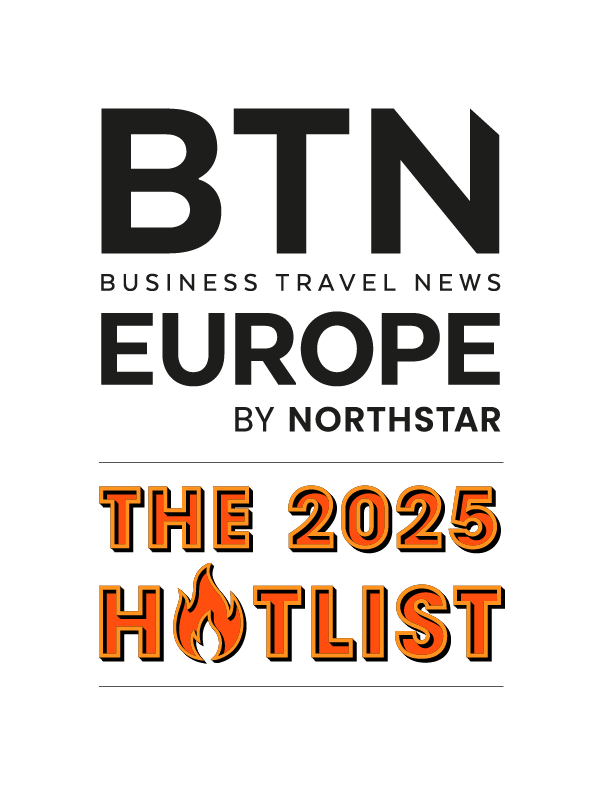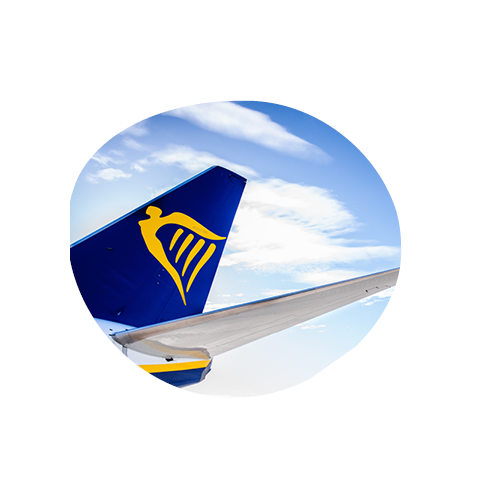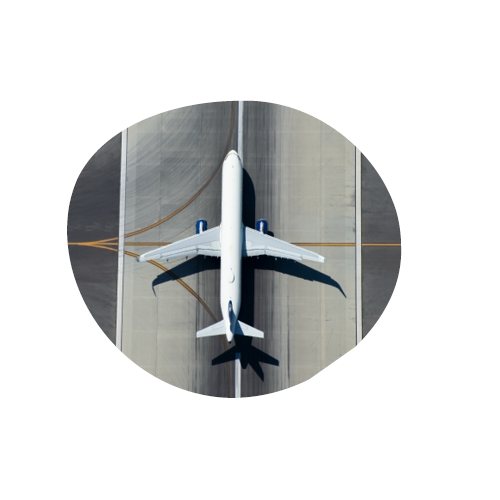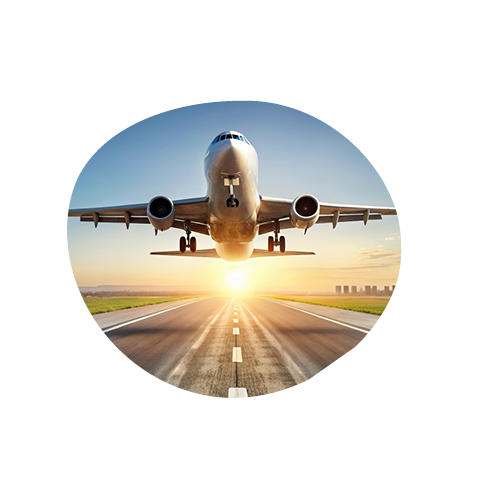THE PEOPLE, PRODUCTS & TRENDS DRIVING INDUSTRY CHANGE

In 2025, the business travel industry is grappling with transformative forces that are reshaping how we work, travel and connect.
Economic uncertainty, geopolitical developments, hybrid working habits and mounting pressure to meet sustainability goals are redefining the priorities of travel managers and suppliers alike. Simultaneously, investment in and the deployment of AI-driven tools and technology are accelerating innovation across the sector.
Based on more than 150 nominations from industry personnel, BTN Europe’s Hotlist recognises the individuals and organisations that are best navigating those external forces and the trends that are shaping the future of business travel. From digital innovators, industry influencers and sustainability specialists, to new technologies, emerging products and evolving trends, each of this year’s 25 Hotlist entries are expected to be creating headlines in 2025 and helping ensure that business travel remains a strategic asset to help corporates' achieve their wider goals.
Not all of this year's entries are making their first appearance on the Hotlist and there are no prizes for guessing which pair of TMCs kick off this year's Hotlist, but these legacy contenders are joined by a diverse cross-section of this industry’s finest advocates, innovators and trends. Read on to discover Business Travel News Europe's 2025 Hotlist.
Words: Lauren Arena, Rob Gill & Andy Hoskins
ORGANISATIONS
AMEX GBT & CWT
A meeting of the mighty?
Will they or won’t they? The fate of Amex GBT’s planned acquisition of CWT currently lies in the hands of regulators in the UK and in the United States whose concerns about the mega-merger are centred on a lessening of competition, reduced innovation, and the potential for rising customer costs and poorer service. Amex GBT has criticised the methodologies and findings of both processes, lambasting in particular the identification of a global multinational (GMN) sector with needs that can be met by only a handful of TMCs – or what Amex GBT calls “a fundamentally erroneous market definition” that does not exist. “Customers have a spectrum of travel requirements. But they are, in essence, substantially similar,” it said. If the deal goes through, the combined company will dwarf its nearest competitors. If it doesn’t, the CMA believes CWT will remain a significant competitor, having put its financial difficulties behind it. Others believe Amex GBT would still come out on top because CWT needs GBT more than GBT needs CWT. In January, the UK's Competition and Markets Authority pushed its decision deadline back by six weeks to 9 March.
SERKO
Shaking up the market
New Zealand-based booking tool provider Serko is upping the ante in 2025. On 7 January it confirmed the completion of its US$12 million acquisition of GetThere from Sabre and then five days later announced the appointment of business travel luminary Johnny Thorsen in the newly created role of vice president of strategic business development. The addition of GetThere puts Serko second only to Concur in terms of North American marketshare and complements its Zeno and Booking.com for Business platforms. It has also signed a five-year partnership with Sabre to develop new product capabilities and broaden its customer base. Serko co-founder and CEO Darrin Grafton said the company would be investing US$100 million over the next three years to “build the travel platform of the future” and has not ruled out further acquisitions. As for Thorsen, who departs Spotnana after nearly four years at the business, he’s back on familiar ground, having served as EMEA director of business development for GetThere in its early days some 25 years ago. Grafton praised Thorsen’s “ability to anticipate trends” in the travel industry, his passion for innovation and his skills that “bring transformative ideas to life.”
RYANAIR
Courting corporates
Europe’s largest airline appears to be taking its latest move into corporate travel more seriously than previous efforts after its fares went live in the new iteration of the Concur Travel booking platform in October. Furthermore, it has also signed deals with third party distributors including Travelfusion and Kyte to help bolster its presence on business travel platforms. It’s also working again with GDSs. But with Ryanair there always seem to be complications, such as its online customer verification process for bookings made via certain third parties. This has caused plenty of problems for corporates and business travellers, and it is also the subject of an ongoing inquiry by Ireland’s Data Protection Commission. Still, Ryanair is a huge player in Europe – carrying 197.2 million passengers in 2024 – and targeting an increase to 250 million by 2030 and to 300 million by 2034. That’s plenty of seats to fill, so maybe the Irish carrier will be more committed to the managed business travel sector than it was a decade ago, when its presence on GDSs was short-lived.
TRAVELPERK
Taking it stateside
Barcelona-based TravelPerk was already gaining ground in the US when co-founder and CEO Avi Meir slammed the accelerator on last year with the acquisition of Chicago-based travel management company AmTrav. The acquisition, the terms of which were not disclosed, doubled TravelPerk's US revenues, which had grown 65 per cent year-over-year in 2023. It also brought TravelPerk new offices in Boston, Los Angeles and Miami in addition to AmTrav's Chicago headquarters. Back in Europe, the TMC’s organic growth has moved it into the continent’s top ten largest TMCs, ranking eighth with €1 billion in European sales in Europe’s Leading TMCs 2024, up from 13th the previous year. The company has also significantly boosted its access to capital. Alongside the AmTrav acquisition, it announced a new credit facility of up to $135 million, backed by Blackstone Credit & Insurance and Blue Owl Credit, having already detailed at the beginning of 2024 a $104 million funding round led by Japanese technology investment firm SoftBank.
LUFTHANSA GROUP
Flexing its muscles
2025 has kicked off with a bang for the Lufthansa Group. The European aviation giant completed its €325 million deal to acquire a 41 per cent stake in Italy’s ITA Airways in January, with an option to purchase the remaining 59 per cent. This follows years of negotiation and a series of concessions to EU regulators that involved relinquishing slots at Italian airports to other carriers. Italy will now become another home market for the group, with hubs at Rome Fiumicino and Milan Linate set to play “a prominent role” and Lufthansa promising a “timely integration” with “offers and optimised connections” to begin this summer. Joint loyalty benefits, codeshare connections and ITA’s admission to Star Alliance are also planned. Presumably, Lufthansa’s recently introduced “environmental cost surcharge” will also be applied to ITA flights. In effect since 1 January 2025, the surcharge of up to €72 applies to all flights originating within the European Union, United Kingdom, Norway and Switzerland. Announcing the surcharge in June 2024 (and eliciting a mixed response), Lufthansa said it resulted from “steadily rising additional costs due to regulatory environmental requirements”. Is it a trend that other airlines will follow?
CISALPINA TOURS
International expansion
Italian TMC Cisalpina Tours began its ambitious international expansion in 2022 after a series of acquisitions in Turkey and Brazil. It also established outposts in the US and Cyprus. In the 24 months that followed, Cisalpina opened additional offices in Germany, France, Spain, the UK and Switzerland. In 2025, its reach will extend to Africa and the Asia-Pacific region with plans to establish operations in Australia, China, India and South Africa. Ranked as the second largest TMC in Italy in 2024 with gross annual sales of €500 million (including €29.6 million from its international business units), Cisalpina is now claiming its place on the global stage. Founded in 1970 as part of the BluVacanze Group – owned by shipping giant MSC – the company has seven offices in Italy, more than 500 employees and serves more than 800 large corporate clients, according to its 2023 financial statement. Watch this space.
ROSEWOOD HOTELS
Grand openings
While it’s been traditional for some years to include in the Hotlist a nod to one of Europe’s most anticipated hotel openings, more often than not the grand throwing open of its doors has slipped into the following year, such are the vagaries of hotel development. But this time we’re doffing our cap to Rosewood Hotels which has two major European additions in the pipeline, doubling our chances of a timely callout. First up is the Rosewood Amsterdam, situated within the former Palace of Justice – built in 1665 – and marking the brand’s debut in the Netherlands. Located in the city’s UNESCO World Heritage-listed Canals District and comprising 124 guestrooms and suites, bookings are now open for stays from 1 June. Also taking shape in a familiar building is the group’s second property in London. The Chancery Rosewood is housed in the Grade II-listed former US Embassy on Grosvenor Square (pictured) and will include 146 guestrooms, ballroom and retail outlets. It is scheduled to open towards the end of the year which, based on our previous form, likely means its first guests won't arrive until 2026.

PEOPLE
JULIEN ETCHANCHU
Cutting to the chase
As Advito’s sustainable collaboration practice leader, Julien Etchanchu is responsible for promoting sustainability strategies both within his own organisation and with clients at a time when, for many corporates, reducing the environmental impact of their travel programmes is at or near the top of their agenda. He has been instrumental in promoting science-based sustainability strategies for clients – providing real, measurable outcomes – and is not afraid to challenge established thinking. His role necessitates frequent speaking engagements at industry events, where he delivers compelling calls for change and describes effective strategies for emissions reductions. One independent observer described him as “constructive and balanced” and as the business travel sustainability expert best able to articulate the challenges of an inherently difficult topic. “He is by far the most clear-eyed business travel sustainability expert and does not dodge the reality that the only way to be really green about travel is not to fly,” they added.
GEHAN COLLIANDER
Digital transformation
Gehan Colliander, global head of travel at Boston Consulting Group (BCG) and a former president of GBTA Europe, has overseen a digital overhaul of her company’s travel programme as she strives to deliver a seamless user experience and reduce operational costs and exposure to risk. Those goals have manifested in the building of a global travel portal with a consistent look and feel but featuring bespoke features for different points of sale. It is a one-stop-shop – a “corporate Trip Advisor” – that allows employees to book and manage travel, but also to rate and review strategic partners, view programme amenities and consume destination guides and advice. It incorporates a single online booking tool that is operational in 90 per cent of its geographies and features local NDC content, with BCG’s adoption rate climbing to 75 per cent of all bookings, including changes and cancellations. Meanwhile, expenses have been eliminated for all air and rail bookings through the deployment of central payment, and around a third of hotel spend is made via virtual cards, with a target of 50 per cent by the year’s end. It has been described by one commentator simply as a “best in class” travel programme.
STEVE SINGH
King-maker
Concur’s co-founder Steve Singh is making waves in the corporate travel world again. After leaving SAP Concur in 2017, Singh said that he did not expect to return to the sector before re-emerging as an investor and chairman of start-up Spotnana in 2021. Last year was another big one for Singh, with his Madrona Ventures investment group leading the acquisition of US-based travel management company Direct Travel and then taking over as CEO of Spotnana from its co-founder Sarosh Waghmar. Singh also has investments in meetings management platform Troop and payment and expense provider Center. So, what’s on the agenda for 2025? Singh has talked about expanding Direct Travel’s operations in Europe, alongside the TMC’s existing partnership with ATPI Group, and his ambition of combining “the best of Spotnana, Troop and Center” with Direct Travel’s AI-based developments and services to create a “far better client service experience than anybody else in the industry”. That’s a bold promise – will Singh and his team deliver?
BEN PARK
Sustainability leader
In his day job, Ben Park is the executive director of travel and sustainability at clinical research organisation Parexel, where he has refined global sourcing strategies and implemented a series of innovative changes – from piloting New Distribution Content (NDC) to implementing an incentive for travellers to switch from planes to trains. The latter has significantly reduced the environmental impact of the company’s travel activity in Germany, where Park is based, and he’s now looking to extend the policy to travellers in France, Spain and Italy. While his sustainability achievements alone are commendable, Park was also nominated for his ongoing advocacy work as regional chair of GBTA Europe. Described as a “transformative leader”, Park has also played an “instrumental” role in designing and delivering GBTA’s sustainable travel management course as well as its sustainability acceleration challenge and maturity assessment. Parexel’s 2025 year-end goals are to reduce CO2 emissions from air travel by 20 per cent from its 2019 baseline and average fleet emissions by 50 per cent. Park undoubtedly has a few more tricks up his sleeve.
KENTON JARVIS
Taking the reins
Budget carrier easyJet has a new CEO in Kenton Jarvis in 2025 after Johan Lundgren stepped down from the role at the start of January after seven years at the helm of Europe's sixth largest airline. Jarvis, who was previously easyJet’s chief financial officer, has just announced a year-on-year reduction in the airline’s losses this winter and a 7 per cent increase in passengers, which gives him a good base to build on. EasyJet has been focused on growing its tour operating brand in recent years but it still has a well-established portfolio of business travel products which are understood to be under review. Will corporate travel come more into the spotlight with arch-rival Ryanair now targeting the sector? EasyJet has built its business travel proposition on being corporate-friendly and a route network serving more “primary” European airports than other low-cost carriers. EasyJet will also boost its presence in Italy this year with new bases at Milan Linate and Rome Fiumicino airports after receiving slots as part of a deal following Lufthansa’s investment in ITA Airways. All eyes are on the orange airline from Luton.
DANNY COCKTON
Elevating roles
Danny Cockton is VP of global travel services at consulting and engineering firm Wood PLC where he and his team have overhauled its travel programme and, crucially, elevated the profile of travel within the organisation. More than 120 TMC partners globally have been consolidated to 22. Online adoption has gone from 13 per cent to 72 per cent. And leakage has been slashed from 30 per cent to 3 per cent. Moreover, Cockton now sits at the company’s top table, involved from the off in new project bids. While those achievements were acknowledged when he and his colleagues landed the Travel Team of the Year accolade at last year’s Business Travel Awards Europe, Cockton is also praised by those who know him for his industry advocacy. He is generous with his time, has a track record for nurturing talent, and speaks passionately and transparently about travel management’s processes and travails. There's no BS here.
ROSEMARIE CAGLIA
Community calling
A senior consultant, researcher and certified trainer, Rosemarie Caglia has been nurturing the development of Italy’s business travel sector for years. As the CEO and co-founder of Travel for Business, she leads a community of more than 1,000 corporate travel and mobility managers across the country, providing learning and networking opportunities aimed at ‘professionalising’ the travel management function and advocating for its increasingly strategic role within an organisation. Caglia is also an advisor to the Italian Association of Travel and Mobility Managers (AITMM), which she helped establish in 2018, and is also part of the Sustainability Working Group at BT4Europe. She presented the latter’s latest position paper in Brussels last October and throughout 2024 worked with more than 15 Italian companies to formulate sustainability strategies related to travel. Caglia has also launched a ‘Mastery in Travel and Mobility Management’ course, enrolments for which have “boomed” this year, she says, largely driven by young professionals. The next generation of travel managers is in capable hands.

DEVELOPMENTS
RETURN TO OFFICE
Back to business
Return to office mandates started gathering pace in 2024 after several big names began clamping down on remote working. While the likes of Amazon, Dell and JPMorgan Chase have called employees back to the office five days a week, others – like consulting firm PwC UK and European carmaker Stellantis – have rolled back flexible work policies to require at least 60 per cent (three days a week) office attendance. What does this mean for business travel? One upshot could be the reversal of growth in more small internal meetings, which had proliferated in a world of remote work. In BTN’s 2024 Meetings Strategy Survey, close to two-thirds of the travel managers involved said demand for smaller group travel, whether for internal or external meetings, had increased over 2019 levels. A further 43 per cent said they were attempting to limit travel for internal meetings. Another implication will be an increase in carbon emissions from commuting activity, an item already on the watchlist for travel and mobility managers involved in CSRD reporting. Despite the broader return-to-office trend, companies in the travel industry are showing few signs of rowing back on remote working – at least for now.
VISA WAIVER SCHEMES
‘Streamlining’ international travel
European border controls are set to undergo a digital transformation in 2025. The UK’s Electronic Travel Authorisation (ETA), first introduced in November 2023, is being rolled out in phases and currently applies to visitors from more than 50 countries. From 2 April 2025, the online pre-travel check will extend to travellers from European countries who do not require a visa. The EU’s similar European Travel Information and Authorisation System (ETIAS) for non-EU residents is also set to launch this year after years of delays, however its planned implementation is contingent on the bloc first implementing its biometric check system, known as the Entry-Exit System (EES), which has also suffered a series of delays. The EES was due to launch last November, but will now be introduced via a “phased approach” in 2025 (a detailed timeline has yet to be announced). ETIAS is expected to go live six months after the EES. The changes are designed to enhance border security across the region but will require more pre-planning by business travellers and/or travel managers. Cost is another consideration to bear in mind. While ETIAS applications are expected to cost €7, the UK government in January proposed a 60 per cent increase to its ETA fee, which would see it rise to £16.
SAF MANDATES
Minimum contributions
2025 should be the year that the aviation industry gets its act together on using more alternative aviation fuels, which the sector likes to call SAF or 'sustainable' aviation fuel. Both the UK government and the EU are introducing SAF mandates this year, initially set at a minimum 2 per cent of all aviation fuel used, which will then rise in percentage terms in the following years. There is much doubt about whether even this initial threshold can be achieved, given the relative dearth of supply of alternative fuels – airline association IATA is forecasting that global production of these fuels will only account for 0.7 per cent of total jet fuel this year. Environmental groups have also talked down the ability of SAF to effectively reduce airline emissions, while airline bosses, including Virgin Atlantic’s CEO Shai Weiss, have warned that the cost of having to use more SAF “without incentives” could force up airfares.
GREENWASHING CASES
More court cases to come?
A number of airlines faced litigation against alleged greenwashing in 2023, but a ‘landmark’ ruling against Dutch carrier KLM in March 2024 turned this growing tide into a tsunami. A slew of lawsuits has since been brought against other carriers after KLM’s suggestions that flying can be or is becoming sustainable through the use of alternative aviation fuels or carbon offsets were deemed to be “misleading”. The European Commission and EU consumer protection authorities in May launched an action against 20 airlines. Two months later, 71 carriers operating at Amsterdam Schiphol received a legal letter from environmental groups ClientEarth, Fossielvrij and Reclame Fossielvrij warning against the “red lines” of aviation advertising, in particular, describing alternative fuels as a “promising solution” and labelling such fuels as “sustainable”. A BTN Europe poll last January also found that 69 per cent of respondents had concerns about the veracity of travel suppliers' sustainability claims. The EU’s incoming Flight Emissions Label (FEL) promises to provide greater transparency on flight emissions and discourage greenwashing, but FEL participation is voluntary, and its success will depend on how widely it is adopted by airlines. In the meantime, greenwashing lawsuits look set to continue.
CSRD REPORTING
Emissions exposed
Ready or not, listed companies in the EU with more than 500 employees and a net turnover of more than €50 million now have to disclose the environmental impact of their activities as part of the EU’s Corporate Sustainability Reporting Directive (CSRD). The scope of the directive, and the number of companies it will affect, will expand over the next four years so that by 2029 even small and midsized businesses (and non-EU companies that generate revenue of more than €150 million in the EU) will be required to submit annual reports, which include the Scope 3.6 emissions generated by a company's business travel activity. The absence of a standardised approach to emission calculations, however, has sparked questions around data accuracy and transparency. As demand for business travel ticks up again, some commentators have also warned that CO2 reduction targets set during the pandemic may now appear harder to achieve. If that is indeed the case, there’ll be no place to hide.

ONES TO WATCH
GLOBAL TENSIONS
Tariffs & trade barriers
Just when global business travel looked like it was on a fairly steady upward trajectory after several tricky years coming out of the pandemic, Donald Trump returns to the White House promising – or at least threatening – a series of potentially damaging trade tariffs. While Europe doesn’t seem to be first in the US President’s firing line, any blanket US tariffs on global imports is bound to have a significant economic impact. The EU seems to be taking a pragmatic approach for now, with European Commission president Ursula von der Leyen warning against a "global race to the bottom" through countries using tariffs to meet national security objectives. There’s plenty of potential instability in Europe too, with uncertainty about the outcome of the war in Ukraine, federal elections in Germany in February and the current French government under prime minister Francois Bayrou looking extremely shaky. Find out more about how geopolitical events could reshape business travel in 2025 in this recent BTN Europe article.
RED TAPE REMOVAL?
Lobbying continues
Business travel around Europe is often made unnecessarily complex through a series of bureaucratic processes – two such EU offenders are the A1 form, which requires cross-border travellers to provide proof of payment of social security in another member state, and the rules around Posted Workers who are temporarily sent to work in other EU countries. European business travel association network BT4Europe has been lobbying hard to ease these bureaucratic “challenges” and is calling for a 14-day exemption from the A1 requirements for business travellers. There has also been some progress on creating a “digital declaration” system for Posted Workers, although the European Commission is proposing this should be voluntary for member states, which might only add to the confusion. Getting these things changed often seems like a thankless task, but perseverance can pay off – the German business travel association VDR finally succeeded last year in its campaign to end the requirement for domestic hotel guests to have to fill in a registration form at check-in.
TAKE2ETON GROUP
Hire power
After the founding of TakeTwo in the UK and US in 2021 by former CTM duo Chris Thelen and Julie Cope, the TMC went on to acquire the Eton Travel Group and expand into Ireland in 2022, and has worked its way up to 22nd place in BTN Europe’s most recent ranking of the UK’s largest agencies. While it has since flown under the radar to some extent, recent recruitment suggests the TMC is poised to push on in 2025. In October last year, it expanded its leadership team with the appointment of former Agiito boss James Parkhouse, with Thelen becoming chairman. “To drive further growth and success as Take2Eton Group, we needed to bring additional support and leadership to the business,” said Thelen. In January this year came another meaningful hire – that of Shelley Mathews, most recently EVP of sales at CTM, in the newly created role of chief commercial officer. “This will be hugely beneficial to Take2Eton as we focus on driving growth and elevating our position in the market in 2025 and beyond,” said Parkhouse.
LOYALTY PLAYS
Direct temptation
It’s no secret that travel suppliers are trying to secure more direct bookings with consumers, including business travellers. This strategy to “own the customer” is typically centred around loyalty programmes, which often act to the detriment of the corporate travel programme by increasing leakage and reducing a buyer’s leverage in supplier negotiations. A recent example was American Airlines’ aborted attempt to use its loyalty programme to encourage travellers to book through certain channels. But this failure doesn’t mean that suppliers will not continue to pursue similar strategies. In a submission to the UK’s Competition and Markets Authority, American Express GBT and CWT noted that direct bookings with travel suppliers already account for “$600 billion out of $1 trillion” of global business travel sales and suppliers were “increasingly competing directly for travellers and winning direct bookings”. There is also the trend of more suppliers creating their own booking platforms targeting SMEs, launched by the likes of Marriott International and Qantas. Business travellers’ heads may also be turned by innovative new products, such as Wizz Air’s Discount Club and All You Can Fly programme.
AI IN ACTION
Investment paying off?
If 2024 was the year of investment in artificial intelligence, then 2025 is the year to keep up the pace of experimentation – and for corporate travel teams, that means leaning in. AI applications have already been used to address frequent traveller concerns, crunch data for analytics reporting and even formulate carbon pricing strategies to help reduce emissions. A swathe of new travel tools – SkyLink, Acai Travel, Zenmer’s Zenia and Swifty, an AI agent backed by the Lufthansa Innovation Hub – are harnessing the power of large language models to transform the booking experience and support organisations. Keesup Choe, CEO of AI-powered data platform PredictX, says corporate adoption of AI agents for T&E operations is also gaining momentum. “Unlike traditional chatbots that interface with humans, AI agents interact with other AI entities, creating a virtual team with specific responsibilities,” he says. This can effectively create a virtual workforce that will prove critical for travel buyers at a time when, according to Choe, “there has never been so few people in charge of the wellbeing of many [and] who are spending so much”. It will also require corporations to amend contracts and supplier agreements to cover against any bias or safety and security issues caused by AI agents.
ACCELERATED NDC ADOPTION
Taking off... at last
It’s taken a long time for NDC to really take off – it was first launched by airlines association IATA in 2012. Now it seems that accelerated adoption is finally happening with the share of NDC bookings exceeding 20 per cent for the first time in June 2024, according to Airline Reporting Corporation. Navan and Gray Dawes are among the TMCs leading this charge – both are reportedly now seeing more than half of British Airways bookings going through NDC channels, and Spotnana has just announced a new NDC integration with the carrier. Airlines have used different strategies to push more bookings down NDC routes, with American Airlines’ aggressive tactics backfiring last year when plans to set TMCs high NDC adoption targets for preferred agency status had to be abandoned. BA's move to end TMCs' private channel agreements is also seen as a move to increase NDC bookings. Other carriers, such as Delta and transatlantic partner Virgin Atlantic, have been content to lag behind their competitors on NDC implementation and strike a more conciliatory tone with the industry.

FURTHER INFORMATION
BTN Europe’s 2025 Hotlist was compiled and written by the Business Travel News Europe editorial team. The people, organisations and trends identified on the list were selected from more than 150 nominations lodged by travel industry personnel between 12 November 2023 and 9 January 2025.
SEE ALSO:
BTN Europe's 2024 Hotlist
BTN Europe's 2023 Hotlist
BTN Europe's 2022 Hotlist
BTN Europe's 2021 Hotlist



































